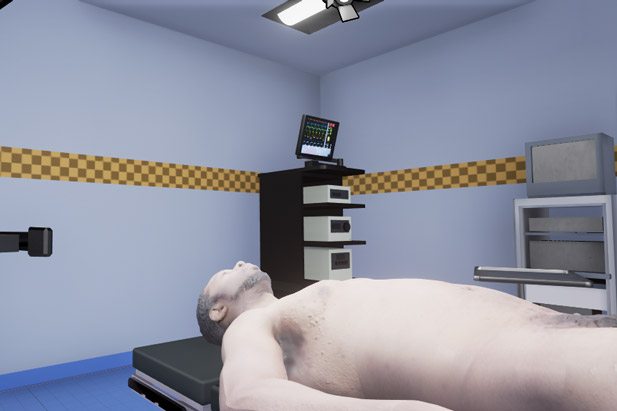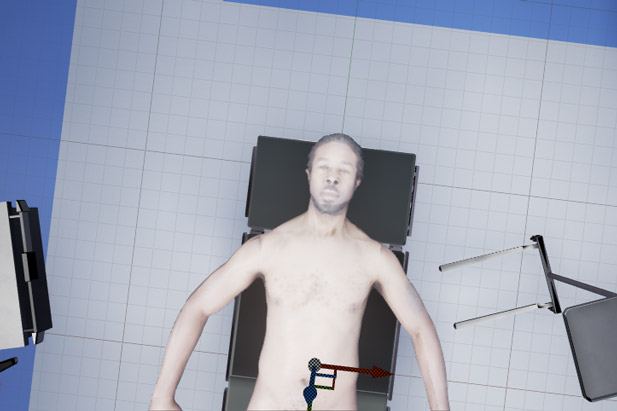Virtual SurgerySIM: Practice makes perfect
How UOIT’s student entrepreneurship program helped medical simulation software company gain footing
June 28, 2016

For surgeons, there is no margin for error on the operating table.
After completing medical school, surgery students enter a five-year residency program where, under the supervision of expert teachers, they put in countless hours of training to develop the hand-eye co-ordination and visuospatial skills needed to do their job. The more operations they perform, the more skilled they become.
Traditionally, surgeons have developed these skills on cadavers. But bodies donated to science remain expensive to maintain, in short supply and they only last for two or three procedures, limiting practice time. But as new medical discoveries occur, the number of skills required of a surgeon continues to expand.
Surgeons who don’t receive adequate practice time pose a great risk. Medical mistakes can lead to malpractice suits. The Canadian Medical Protective Association, which defends Canadian doctors accused of malpractice, and the Healthcare Insurance Reciprocal of Canada, which provides liability insurance for health-care organizations and their employees, recently conducted a 10-year analysis of surgery-related malpractice complaints and settlements. The study identified severe harm – including organ damage, paralysis and death – in approximately one-third of the cases documented in the report.
Benjamin Sainsbury, a Computer Science PhD candidate at the University of Ontario Institute of Technology (UOIT), has a solution: software that trains surgeons to practice surgical procedures in a virtual operating theatre. Sainsbury’s software design looks and feels like the real thing – complete with a 3D virtual patient that bruises, bleeds and reacts in other ways to the surgeon’s touch. The simulator applies haptic technology (recreating the sense of touch) in a 3D immersive environment. Real-time haptic feedback helps surgeons-in-training build muscle memory, enhancing their precision and skill. The software can also be used an unlimited number of times.
Sainsbury’s company, Virtual SurgerySIM Inc., is currently developing modules to simulate kidney removal, as well as the removal of kidney cancer and stones. It will then work on modules for liver-related procedures. It is validating its solution at hospitals including:
- Lakeridge Health in Oshawa, Ontario
- Michael Garron Hospital (formerly Toronto East General Hospital) in Toronto, Ontario
- Buffalo General Medical Center in Buffalo, New York
Virtual SurgerySIM’s team includes three computer science and mechatronics specialists, as well as Medical Advisor Dr. Rajiv K Singal, a Urologic Surgeon at Michael Garron Hospital and Assistant Professor in the University of Toronto’s Department of Surgery.
Virtual SurgerySIM’s entrepreneurial legacy

Virtual SurgerySIM is one of the university’s latest student entrepreneurial success stories. The company’s roots can be traced back to Sainsbury’s first encounter with the university’s Brilliant Entrepreneurship program, which helped get set him on the right business trajectory. Last year’s $5,500 award from the university’s Firefly Entrepreneurship Fund enabled the company to spend its first summer with the Brilliant Incubator for students, located in and served by the Spark Innovation Centre in downtown Oshawa. An additional $5,000 Firefly award this year means they can stay in the incubator for another summer. The company has also secured $32,500 in matching seed funding from Northumberland Community Futures Development Corporation’s (CFDC) N1M initiative.
“The funding we received through UOIT Brilliant was very helpful and came at a critical time,” explains Sainsbury. “I also met investors and got into Lakeridge Hospital through the connections we made while in the program. In addition, UOIT Brilliant staff have been generous with their sage advice, feedback, mentorship and introductions to subject matter experts, all of which has helped us develop our business and solve problems.”
Thanks to all of this preparation, Virtual SurgerySIM was ready to venture further. The company was a finalist in the Northumberland CFDC's N100 startup competition, and it plans to prepare an investment proposal to the Northumberland CFDC Board of Directors. Virtual SurgerySIM has a seed capital fund raising strategy in development, and it is discussing a collaboration with the National Research Council Canada’s Simulation Team.
With all of these experiences under his belt and a bright future ahead, Sainsbury has some advice of his own to pass along to other aspiring student entrepreneurs:
“When you start working on your business, you have many things coming at you from different angles. Faced with the challenges of time and resource management, pick whatever is the biggest priority to move the business forward.”
About UOIT Brilliant Entrepreneurship
Brilliant Entrepreneurship is the University of Ontario Institute of Technology’s non-credit entrepreneurship program. Brilliant is supported in part by FastStart and Incubate, Innovate Network of Canada (I-INC). FastStart is a member of the ONE network and is funded in part by the Ontario Centres of Excellence. I-INC is supported in part by the National Research Council Canada.



